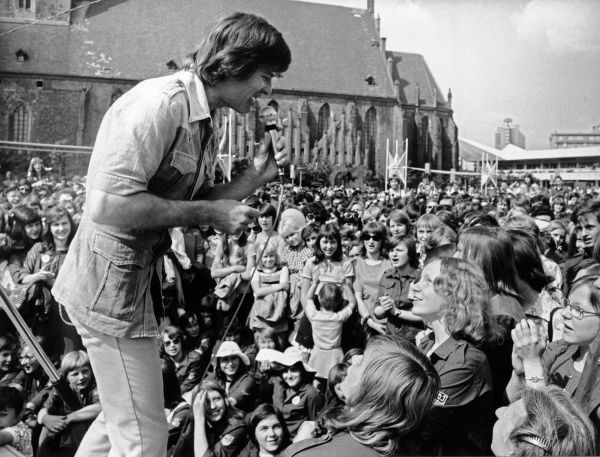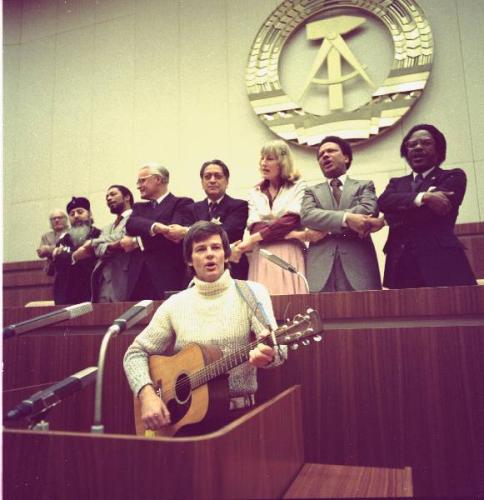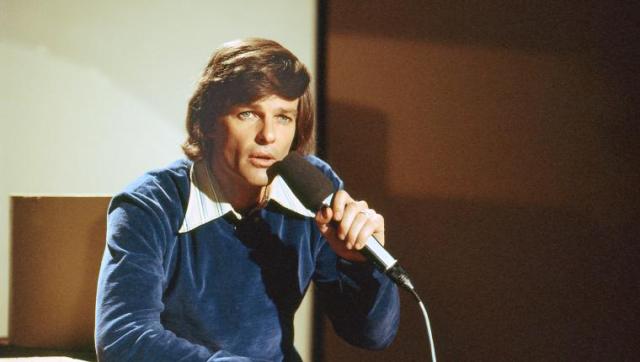He often pinched his lips with his fingers to remind neighbours and curious children of the vow of eternal silence that kept him alive. Sejfulla Maleshova’s punishment was unimaginable isolation

On a beautiful hilly graveyard outside the Albanian town of Fier, there lies a grave very different from thousands others. The old pair running the worn-out flowershop nearby mumbles Albanian, looks distrustful at me; unwilling to help. Upon driving away the old man waves at me. The amount of time we cross through the graveyard convince me of how impossible it would have been to locate Maleshova on my own. A small man with a rough fist full of callous skin greets me and just the word of Maleshova is enough. The gravedigger willingly leads me to it. Surrounded by decorated gravestones in a sea of fresh flowers, the restingplace of Sejfulla Maleshova is a small untouched island of overgrown weeds and high tousled grass. A simple grey stone battered by years gone by stands out. In a lonely way. Lonely like the last eleven years of the Albanian poet, auhtor and politician’s life.
Maleshova’s fall from grace came sudden. Once ousted he was forced into exile in a dreary industrial town on the flat plains of central Albania. Twice a day every morning and evening he had to report himself at the headquarters of Domestic affairs in Fier. To prove he was still in town. The famous writer and former statesman passed the front desk and stopped at the leading officer. Then raised his right hand signalling; ‘here I am’ Then turned around and walked out. This bizarre ritual went on until his death.
Rise and Fall
Maleshovas political speeches and talented writing secured him praise and privileges from the Communist leader Enver Hoxha. The two men had fought against occupying forces during World War II from their base in the Albanian mountains. Hoxha served as strategic leader while Maleshova was Head of Propaganda. He saw himself as a ‘partisan writer’ under the name of Lame Kodra. When Albania’s Communist Party seized power in 1945 Maleshova was appointed Minister of Culture and Propaganda. Later he became Minister of Education and President of The League of Albanian Writers and Artists. Maleshova was a moderate Communist but still part of the Hoxha’s inner circle within the Communist Party. Born in deep poverty in 1900 near the town of Gjirokaster, where Hoxha himself was born, Maleshova had reached the political top in Albanian society by the age 45. He had studied medicine in Italy. Been in exile in Paris during 1920s and was political schooled in Moscow before becomming involved with Hoxha’s partisan movement. When World War II ended Maleshova was an influential Communist and respected cosmopolitan.
A letter to President Harry Truman and British PM Clement Atlee changed everything. Maleshova had crossed the line. Along with colleagues from The League of Albanian Writers and Artist he wrote and signed an open letter, that called for Western recognition of Albania. Maleshova had crossed the line. Enver Hoxha was outraged and stated in fury, that the only viable recognition viable was Moscow’s. Maleshova was accused of ‘rightist deviation’ and expelled from the Communist Party in 1948. Maleshova was sentenced to low paid work at the Institute of Science in Tirana, where he worked on a Russian-Albanian dictionary. Sometimes he would get picked to translate Russian litterature something he appreciated dearly. He even got some of his early poems publish in the Soviet Union under his the name Lame Kodra. Life was quite good. Until 1956 when Hoxha once again attacked Albania’s intellectual class.
Hoxha’s ‘Gesture’.
Maleshova was forced out of Tirana with permission to bring his beloved collection of books with him. Maleshova and his cousin grapped as many they could carry and left for the town of Ballsh in southern Albania. In 1960 Maleshova got transferred to Fier. His last exile. As in other Communist countries purges raged through society and the Hoxha regime hit political opponents and intellectuals hard with terror and death. As a gesture Hoxha offered Maleshova a licence to live if he agreed on a vow of eternal silence. Maleshova wasn’t allowed to write or speak. Not to his family, not to anyone ever again. Maleshova choosed life. Word has it, that one day a peasant came by and saw Maleshovas many books and exclaimed; “How could you have done wrong after reading so many books?”. Maleshova smelled the trap realizing the peasant was sent by Hoxha and therefore he smiled friendly and pointed towards the door.
Sejfulla Maleshova and Enver Hoxha.
In Fier, the former statesman was installed in an old warehouse, where the former statesman carried out simple, monotous work. Far away from Tirana’s elevated circles. Completely shunned by his fellow citizens his social life was reduced to watching children play football. If anyone dared speak to him he simply pinched his lips with two fingers. Maleshova became increasingly ill and sought treatment at the local hospital. He received a minimum of treatment and often tumbled his way home using trees and housewalls to keep his balance. Helping the dying man to his feet wpould be punished with prison. Maleshova died as an outcast in 1971. His funeral was attended by his sister, the local gravedigger and two agents from the Sigurimi, Albania’s secret police, in pouring rain. According to Enver Hoxha’s orders, the funeral was carried out… in utter silence. In 1993 a group of writers found his grave and gave him a lively funeral with hymns and voices.
If You Ever Get There
Try locating the office of the gravedigger. Once you have found that, you are actually very close. It’s a primitive low brick building which where white in the times of Hoxha’s regime, but nowadays paint had fallen down everywhere leaving grey, battered bricks visible. Take the hand of the gravedigger and shake it. He will be smiling all the way. Say “Maleshova” and then walk with him for less than a minute. Once the gravedigger stops, you are there. You have found the grave of a man which use of words, written and spoken, silenced him and gave him a very lonely death.
The Grave of Sejfulla Maleshova. Fier (Photo: Jannik Bay Hansen)
Sources: Drita Magazine, www.gazetadita.al, www.radiokosovaelire.com, www.prabook.com, www.albertvataj.com, www.kohajone.com, www.shqiperia.com, Albania as dictatorship and democracy (book).





